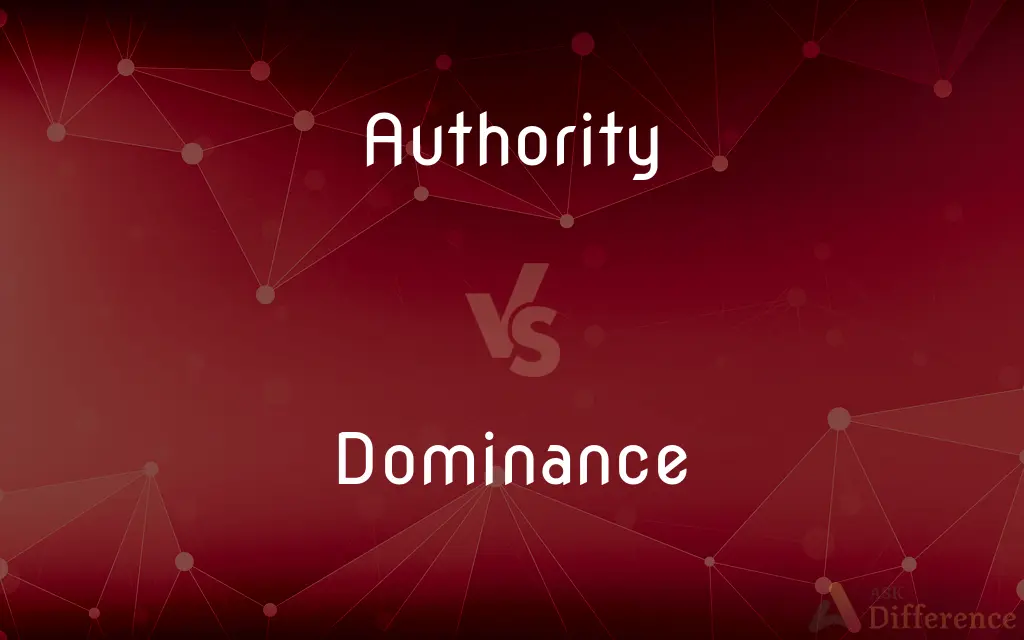Authority vs. Dominance — What's the Difference?
By Fiza Rafique & Urooj Arif — Updated on March 29, 2024
Authority refers to the legitimate power to lead or make decisions, often recognized by society or institutions, while dominance is the ability to influence or control others, often through force or persuasion.

Difference Between Authority and Dominance
Table of Contents
ADVERTISEMENT
Key Differences
Authority is a concept that involves the right and legitimacy to govern, make decisions, or command, often granted by a legal or societal framework. On the other hand, dominance relates to the exercise of power or influence over others, which can be achieved through various means, including physical strength, social manipulation, or economic control.
While authority is often associated with a position or role that comes with certain responsibilities and powers, dominance is more about the relationship dynamics between individuals or groups. For instance, a manager may have authority over their employees, sanctioned by the organizational structure, whereas a dominant personality in a group may not hold any formal position of power but can still influence group decisions or behavior.
In terms of acquisition, authority is usually obtained through formal means such as election, appointment, or inheritance, and is often associated with certain expectations and limitations. Dominance, however, can be acquired or asserted through various means, including competition, coercion, or natural leadership qualities, and is not necessarily bound by formal rules or expectations.
The expression of authority typically involves the enactment of rules, directives, or policies, and it relies on the recognition and acceptance of that authority by others. Dominance, in contrast, is often expressed through behaviors or actions that establish control or superiority, which may or may not be accepted willingly by others.
Understanding the distinction between authority and dominance is crucial in analyzing social, political, and organizational structures. While authority emphasizes the formal and legitimate aspects of power, dominance focuses on the practical and often informal ways that power is exercised and manifested in relationships.
ADVERTISEMENT
Comparison Chart
Definition
Legitimate power to lead or make decisions.
Ability to influence or control others.
Basis
Legal or societal sanction.
Control or influence, regardless of legitimacy.
Acquisition
Formal means (election, appointment, inheritance).
Various means (competition, coercion, leadership qualities).
Expression
Enactment of rules, directives, policies.
Behaviors or actions that establish control or superiority.
Relationship
Associated with a position or role.
Related to dynamics between individuals or groups.
Compare with Definitions
Authority
An expert on a particular subject.
She is an authority on ancient Roman history.
Dominance
A dominant position in social or economic systems.
Their dominance in the market allows them to set prices.
Authority
The power or right to give orders and enforce rules.
Teachers have the authority to control their classrooms.
Dominance
The state of being dominant; superior or more powerful.
In many animal species, males establish dominance through combat.
Authority
The legitimate power to make decisions and enforce obedience.
The local government has the authority to impose curfews.
Dominance
Control or the exercise of control; sovereignty.
The coach's dominance over the team's strategy is unquestioned.
Authority
The moral or legal right or ability to control.
Parents have authority over their children's education.
Dominance
The property of being dominant in genetics.
Brown eye color is a result of the dominance of the brown eye allele.
Authority
Legal or formal permission to do something.
You need the authority to access these records.
Dominance
Power and influence over others.
The company's dominance in the industry is due to its innovative products.
Authority
In the fields of sociology and political science, authority is the legitimate power that a person or a group of persons possess and practice over other people. In a civil state, authority is made formal by way of a judicial branch and an executive branch of government.In the exercise of governance, the terms authority and power are inaccurate synonyms.
Dominance
The condition or fact of being dominant.
Authority
The power to enforce laws, exact obedience, command, determine, or judge.
Dominance
The state of being dominant; of prime importance; supremacy.
Authority
One that is invested with this power, especially a government or body of government officials
Land titles issued by the civil authority.
Dominance
Being in a position of power, authority or ascendancy over others.
Authority
Power assigned to another; authorization
Deputies were given authority to make arrests.
Dominance
(physiology) The superior development of or preference for one side of the body or one of a pair of organs; such as being right-handed.
Authority
A public agency or corporation with administrative powers in a specified field
A city transit authority.
Dominance
The property of a gene such that it suppresses the expression of its allele.
Authority
An accepted source of expert information or advice
A noted authority on birds.
A reference book often cited as an authority.
Dominance
Predominance; ascendency; authority.
Authority
A quotation or citation from such a source
Biblical authorities for a moral argument.
Dominance
Superior development of one side of the body
Authority
Justification; grounds
On what authority do you make such a claim?.
Dominance
The state that exists when one person or group has power over another;
Her apparent dominance of her husband was really her attempt to make him pay attention to her
Authority
A conclusive statement or decision that may be taken as a guide or precedent.
Dominance
The power or right to give orders or make decisions;
He has the authority to issue warrants
Deputies are given authorization to make arrests
Authority
Power to influence or persuade resulting from knowledge or experience
Political observers who acquire authority with age.
Authority
Confidence derived from experience or practice; firm self-assurance
Played the sonata with authority.
Authority
(uncountable) Power or right to make or enforce rules or give orders; or a position having such power or right.
I have the authority to penalise the staff in my department, but not the authority to sack them.
Vigilantes may have the power to nab criminals, but they lack the authority.
She lost all respect and authority after turning up drunk at the meeting.
Respect my authority!
Authority
(plural) Persons, regarded collectively, who occupy official positions of power; police or law enforcement.
Authorities say the suspect fled on foot.
Authority
(countable) A reliable, definitive source of information on a subject.
The world's foremost authority on orangutans
My cheap dictionary is not the authority on word derivations.
Authority
(uncountable) Status as a trustworthy source of information, reputation for mastery or expertise; or claim to such status or reputation.
Some thinkers regard appealing to authority as a logical fallacy; others regard it as a legitimate form of argument.
Authority
Official permission; authorisation to act in some capacity on behalf of a ruling entity.
Authority
(countable) A government-owned agency that runs a revenue-generating activity for public benefit.
New York Port Authority
Chicago Transit Authority
Authority
Legal or rightful power; a right to command or to act; power exercised buy a person in virtue of his office or trust; dominion; jurisdiction; authorization; as, the authority of a prince over subjects, and of parents over children; the authority of a court.
Thus can the demigod, Authority,Make us pay down for our offense.
By what authority doest thou these things ?
Authority
Government; the persons or the body exercising power or command; as, the local authorities of the States; the military authorities.
Authority
The power derived from opinion, respect, or esteem; influence of character, office, or station, or mental or moral superiority, and the like; claim to be believed or obeyed; as, an historian of no authority; a magistrate of great authority.
Authority
That which, or one who, is claimed or appealed to in support of opinions, actions, measures, etc.
Wilt thou be glass wherein it shall discernAuthority for sin, warrant for blame.
Authority
The power or right to give orders or make decisions;
He has the authority to issue warrants
Deputies are given authorization to make arrests
Authority
(usually plural) persons who exercise (administrative) control over others;
The authorities have issued a curfew
Authority
An expert whose views are taken as definitive;
He is an authority on corporate law
Authority
Freedom from doubt; belief in yourself and your abilities;
His assurance in his superiority did not make him popular
After that failure he lost his confidence
She spoke with authority
Authority
An administrative unit of government;
The Central Intelligence Agency
The Census Bureau
Office of Management and Budget
Tennessee Valley Authority
Authority
Official permission or approval;
Authority for the program was renewed several times
Authority
An authoritative written work;
This book is the final authority on the life of Milton
Common Curiosities
Can authority be challenged?
Yes, authority can be challenged if it is deemed illegitimate, misused, or no longer representative of the group or organization's values or needs.
How do cultural values influence perceptions of authority and dominance?
Cultural values shape how authority and dominance are perceived, respected, or challenged, influencing the acceptance of hierarchical structures or the valorization of assertive behaviors.
How does authority affect leadership?
Authority provides leaders with the legitimate right to make decisions and guide actions within an organization or group, affecting leadership effectiveness and compliance.
What is the difference between authority and power?
Authority is a subset of power characterized by legitimacy and recognition within a system, while power is the broader ability to influence or control outcomes.
What is the relationship between authority and trust?
Authority often relies on trust from those being led; without trust, the legitimacy and effectiveness of authority can be undermined.
How can dominance affect group dynamics?
Dominance can impact group dynamics by influencing decision-making processes, leadership styles, and the distribution of roles and responsibilities within the group.
Can someone have dominance without authority?
Yes, an individual or entity can exercise dominance through means such as force, persuasion, or social influence, even without formal authority.
Can dominance change over time?
Yes, dominance can change over time due to shifts in power dynamics, societal changes, or changes in individual or group capabilities.
Is dominance always negative?
Not necessarily. Dominance can be perceived negatively if it involves coercion or oppression, but it can also arise from natural leadership qualities or expertise.
Can dominance be beneficial in competitive environments?
Yes, dominance can provide advantages in competitive environments by establishing leadership, directing group efforts, and influencing competitors' strategies.
What factors can undermine authority?
Factors such as corruption, incompetence, lack of transparency, and failure to meet expectations can undermine authority.
How do social structures influence dominance?
Social structures, including hierarchical organization and cultural norms, can influence the expression and acceptance of dominance within a community or group.
What role does communication play in establishing authority or dominance?
Effective communication is crucial in establishing both authority and dominance, as it helps to articulate visions, enforce decisions, and influence others.
How is authority established in democratic systems?
In democratic systems, authority is established through electoral processes, where leaders are chosen by the populace to represent and make decisions on their behalf.
What is the role of ethics in the exercise of authority and dominance?
Ethics play a critical role in ensuring that authority and dominance are exercised responsibly, fairly, and with respect for the rights and dignity of others.
Share Your Discovery

Previous Comparison
Bats vs. Bat
Next Comparison
Coal vs. PutterAuthor Spotlight
Written by
Fiza RafiqueFiza Rafique is a skilled content writer at AskDifference.com, where she meticulously refines and enhances written pieces. Drawing from her vast editorial expertise, Fiza ensures clarity, accuracy, and precision in every article. Passionate about language, she continually seeks to elevate the quality of content for readers worldwide.
Co-written by
Urooj ArifUrooj is a skilled content writer at Ask Difference, known for her exceptional ability to simplify complex topics into engaging and informative content. With a passion for research and a flair for clear, concise writing, she consistently delivers articles that resonate with our diverse audience.















































